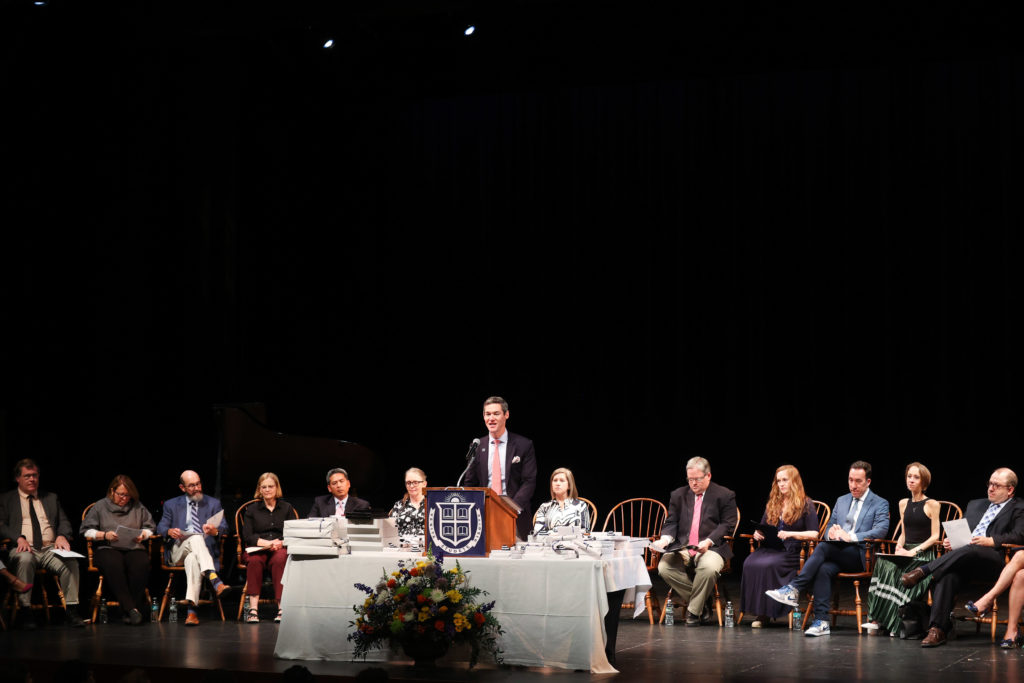 At the end of each school year here at Blair Academy, the Underclass Prize Assembly and the Senior Prize Assembly recognize student accomplishments in subjects, departments, and the community. Despite commending achievements, however, the prize assemblies have limitations.
At the end of each school year here at Blair Academy, the Underclass Prize Assembly and the Senior Prize Assembly recognize student accomplishments in subjects, departments, and the community. Despite commending achievements, however, the prize assemblies have limitations.
Why can’t students in AP Biology win prizes for biology? The biology prize at Blair, named the “Ninth Grade Biology Prize,” is reserved for freshmen. Apple Wu ‘24, recipient of the prize in her freshman year and a student of AP Biology in her junior year, said “I feel like I did a lot more work in AP Bio than the freshmen in Bio and I’m not even eligible.” Until multiple sophomores enrolled in AP Chemistry in the 2022-2023 school year, AP Chemistry students were similarly ineligible for the Tenth Grade Chemistry Prize. Even so, the non-sophomores are still out of consideration, even if they deserve the prize equally.
While the eligibility of certain prizes is puzzling, the number of levels a prize comprises is also inconsistent. To illustrate, both mathematics and foreign languages are leveled curriculums, yet each level of mathematics has its own prize and each language, which means all levels of a language, only has one prize. It is true that certain languages, such as Latin, may have fewer students in each level, but I believe competitiveness should not hinder departments from giving students equal opportunity for winning awards.
Awards could distort students’ perceptions of their academic abilities. Although students are aware of the competitiveness of certain awards, such as the history awards which are awarded to few students per grade, subconsciously, equally competent students might doubt their abilities and hard work. One might assume that awards certainly engender positive feedback for award recipients, but several award recipients last year, who wished to remain anonymous, agreed with the statement “the awards made me feel somewhat self-conscious.”
In a voting process where voters are unfamiliar with candidates and even doubt their own voting qualifications, the results can’t be truly reflective. “If I never taught that student, then I don’t feel like I have authority and the expertise to determine if that person deserves the award,” Spanish teacher Ms. Castillo said. To be as impartial as possible, Ms. Castillo refrains from voting for students she doesn’t know. “I would just state my case for the person that I know, but otherwise I can’t say it must be this student or that,” Ms. Castillo added.
However, the tendency to vote for students a teacher recognizes causes another problem: repetition. The mentality of teachers and the setup of prizes increase the chances of prior recipients of prizes to win prizes repeatedly. After discussing her lack of acquaintance with nominees, Ms. Castillo also admitted to her tendency to vote for names that she recognizes, whether because the student is a past prize winner, or because she had interacted with the student more in class or in extracurriculars. It is important that we understand that teachers rewarding students who had attained prizes in the past is not favoritism, but human nature.
The process of selecting prize recipients could induce stress in teachers and students and the eligibility for some prizes are flawed. Regardless of these limitations, the prize assembly does hold merit by recognizing students truly accomplished in, passionate about, and devoted to different subjects.
